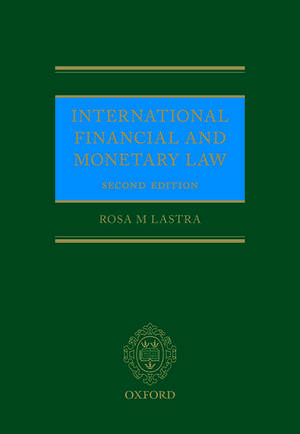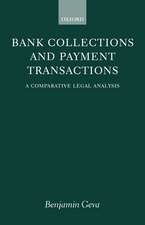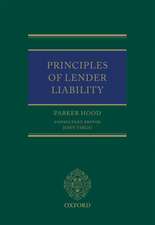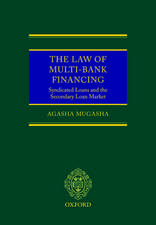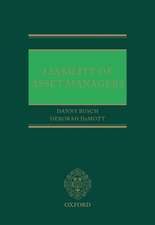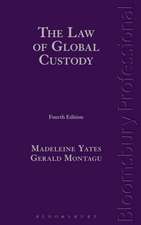International Financial and Monetary Law
Autor Rosa Lastraen Limba Engleză Hardback – 22 ian 2015
Preț: 2074.03 lei
Preț vechi: 3151.38 lei
-34% Nou
Puncte Express: 3111
Preț estimativ în valută:
396.89€ • 417.33$ • 327.93£
396.89€ • 417.33$ • 327.93£
Carte tipărită la comandă
Livrare economică 07-12 aprilie
Preluare comenzi: 021 569.72.76
Specificații
ISBN-13: 9780199671090
ISBN-10: 0199671095
Pagini: 678
Dimensiuni: 177 x 252 x 40 mm
Greutate: 1.31 kg
Ediția:Revised
Editura: Oxford University Press
Colecția OUP Oxford
Locul publicării:Oxford, United Kingdom
ISBN-10: 0199671095
Pagini: 678
Dimensiuni: 177 x 252 x 40 mm
Greutate: 1.31 kg
Ediția:Revised
Editura: Oxford University Press
Colecția OUP Oxford
Locul publicării:Oxford, United Kingdom
Recenzii
International Financial and Monetary Law is absolutely remarkable. It combines impeccable legal analysis and a deep understanding of the economics of the issues raised. The developments on the IMF, the European Union, the Supervisory setting, Central Banks Law, ... contain a wealth of insights that make the book an indispensable tool for students, researchers and practitioners.
Rosa Maria Lastra's experience and thorough research shine through in this clear, authoritative, cohesive and readable book on the complex topic of international, financial and monetary law. She manages to explain the complex evolution of the different regulations and laws, the economic rationale underpinning them, and the roles of the various different players, while putting everything in an appropriate institutional context. The result is a thoughtful assessment of the significance of the many changes that have taken place in the regulatory frameworks and of the challenges they try to overcome.
International and Financial Monetary Law Rosa Lastra's excellent new book, greatly extends and updates the author's previous work, at a moment in history where recent crises are stimulating new and deeper thinking about the legal and institutional foundations of the system. Moreover, is not just for lawyers! Any policy maker, economist and market practitioner interested in where this complicated and rapidly changing world of international money, central banking and finance is heading will greatly benefit from consulting and reading this superb book by one of the world's greatest experts in the field.
This is a tremendous achievement - a systematic, thorough, and timely presentation and analysis of some of the most important legal and policy issues facing the world's economies today. Dr. Lastra's work sets the standard for scholarship across the entire field of monetary law. It is indispensable resource for anyone working and thinking in this field. This is an amazing compilation of information and insightful analysis of important legal issues that are treated almost nowhere else.
This is the definitive source for understanding the legal framework within which central banks operate and relate to one another across borders. The tasks assigned to central banks have increased significantly since the financial crisis, to include a focus on financial stability as much as monetary policy. At the same time, profound changes to the structure of the Eurozone have resulted in a complex layering of obligations as regards money and banking supervision. The need for such a comprehensive and well-written account of the legal framework has never been greater.
This second edition is at once a definitive lawyer's textbook on monetary affairs and the financial sector, an indispensable and comprehensively researched desktop reference for those working in or studying the field, and most profoundly, a rich jurisprudential reflection on the relation between national, European and international laws and institutions. It thus constitutes a major contribution to the scholarship of international economic law and regulation.
International and Financial Monetary Law is a great work. For bankers, economists, lawyers and regulators, it covers the entire terrain of law and regulation relating to money, emphasizing the key role of central banks. It is particularly instructive in its examination of the role of central banks as lenders of last resort.
Professor Lastra, one of the world's preeminent authorities on financial regulation, has done both the academy and practitioners an enormous service in updating her seminal work on central banks in the global financial system. This edition skilfully describes the current system and fills in the gaps relating to recent reforms-and as such is a critical contribution to the literature.
The new book of Rosa Lastra revises and updates a former edition on financial and monetary law at national, European and international levels. There are few specialists in this multidisciplinary field who could present such a rigorous synthesis of this vast topic and to succeed in achieving this goal in less than 600 pages. Professor Lastra's book, based on a profound knowledge of the subject, is a timely one because it takes into account the financial and institutional developments which derive from the most serious crisis since the great depression of the thirties.
The recent financial crisis has spawned a huge volume of new legislation and policy initiatives at national, regional and international levels. This has been especially pronounced in the Eurozone, where the inadequacy of the original institutional design was rapidly exposed by gathering storm. An initial raft of ad hoc measures is now giving way to longer term remedial planning, but the scope, pace and nature of the reforms necessarily tends to obscure their importance and complicates the quest for a clear understanding of the new structures. In line with her unfailing practice and drawing upon her unparalleled reservoir of experience, Professor Lastra provides a lucid and accessible explanation of all of these developments, and guides the reader through a minefield of new regulation and policy.
International and Financial Monetary Law is a classic. The author is one of the greatest writers in this field and has in the second edition of this work delivered a tour du force. If you want to know about the law and practice of central banking, the IMF, the meaning of money and the international architecture generally, all in one magnificent volume, you have to read this outstanding work.
The turmoil from the financial crisis, and the ensuing regulatory and structural changes in the financial world since the publication of [this book's] first edition, fully justify, and require, the broader scope indicated by its title. Rosa Lastra's breath of knowledge and experience []make her the ideal person to write this book. It is simply amazing how comprehensive her knowledge is. This book should be an essential component in the collection of any practitioner in the field.
Rosa M. Lastra, one of the leading experts on central banks and a pioneer in central banking law, has written the second edition of her treatise on international financial and monetary law, and students of these disciplines are the better for her diligence, expertise, and creativity in addressing these fast-developing issues ... The book is well worth the purchase for experts and libraries.
Rosa Maria Lastra's experience and thorough research shine through in this clear, authoritative, cohesive and readable book on the complex topic of international, financial and monetary law. She manages to explain the complex evolution of the different regulations and laws, the economic rationale underpinning them, and the roles of the various different players, while putting everything in an appropriate institutional context. The result is a thoughtful assessment of the significance of the many changes that have taken place in the regulatory frameworks and of the challenges they try to overcome.
International and Financial Monetary Law Rosa Lastra's excellent new book, greatly extends and updates the author's previous work, at a moment in history where recent crises are stimulating new and deeper thinking about the legal and institutional foundations of the system. Moreover, is not just for lawyers! Any policy maker, economist and market practitioner interested in where this complicated and rapidly changing world of international money, central banking and finance is heading will greatly benefit from consulting and reading this superb book by one of the world's greatest experts in the field.
This is a tremendous achievement - a systematic, thorough, and timely presentation and analysis of some of the most important legal and policy issues facing the world's economies today. Dr. Lastra's work sets the standard for scholarship across the entire field of monetary law. It is indispensable resource for anyone working and thinking in this field. This is an amazing compilation of information and insightful analysis of important legal issues that are treated almost nowhere else.
This is the definitive source for understanding the legal framework within which central banks operate and relate to one another across borders. The tasks assigned to central banks have increased significantly since the financial crisis, to include a focus on financial stability as much as monetary policy. At the same time, profound changes to the structure of the Eurozone have resulted in a complex layering of obligations as regards money and banking supervision. The need for such a comprehensive and well-written account of the legal framework has never been greater.
This second edition is at once a definitive lawyer's textbook on monetary affairs and the financial sector, an indispensable and comprehensively researched desktop reference for those working in or studying the field, and most profoundly, a rich jurisprudential reflection on the relation between national, European and international laws and institutions. It thus constitutes a major contribution to the scholarship of international economic law and regulation.
International and Financial Monetary Law is a great work. For bankers, economists, lawyers and regulators, it covers the entire terrain of law and regulation relating to money, emphasizing the key role of central banks. It is particularly instructive in its examination of the role of central banks as lenders of last resort.
Professor Lastra, one of the world's preeminent authorities on financial regulation, has done both the academy and practitioners an enormous service in updating her seminal work on central banks in the global financial system. This edition skilfully describes the current system and fills in the gaps relating to recent reforms-and as such is a critical contribution to the literature.
The new book of Rosa Lastra revises and updates a former edition on financial and monetary law at national, European and international levels. There are few specialists in this multidisciplinary field who could present such a rigorous synthesis of this vast topic and to succeed in achieving this goal in less than 600 pages. Professor Lastra's book, based on a profound knowledge of the subject, is a timely one because it takes into account the financial and institutional developments which derive from the most serious crisis since the great depression of the thirties.
The recent financial crisis has spawned a huge volume of new legislation and policy initiatives at national, regional and international levels. This has been especially pronounced in the Eurozone, where the inadequacy of the original institutional design was rapidly exposed by gathering storm. An initial raft of ad hoc measures is now giving way to longer term remedial planning, but the scope, pace and nature of the reforms necessarily tends to obscure their importance and complicates the quest for a clear understanding of the new structures. In line with her unfailing practice and drawing upon her unparalleled reservoir of experience, Professor Lastra provides a lucid and accessible explanation of all of these developments, and guides the reader through a minefield of new regulation and policy.
International and Financial Monetary Law is a classic. The author is one of the greatest writers in this field and has in the second edition of this work delivered a tour du force. If you want to know about the law and practice of central banking, the IMF, the meaning of money and the international architecture generally, all in one magnificent volume, you have to read this outstanding work.
The turmoil from the financial crisis, and the ensuing regulatory and structural changes in the financial world since the publication of [this book's] first edition, fully justify, and require, the broader scope indicated by its title. Rosa Lastra's breath of knowledge and experience []make her the ideal person to write this book. It is simply amazing how comprehensive her knowledge is. This book should be an essential component in the collection of any practitioner in the field.
Rosa M. Lastra, one of the leading experts on central banks and a pioneer in central banking law, has written the second edition of her treatise on international financial and monetary law, and students of these disciplines are the better for her diligence, expertise, and creativity in addressing these fast-developing issues ... The book is well worth the purchase for experts and libraries.
Notă biografică
Rosa Lastra is Professor in International Financial and Monetary Law at the Centre for Commercial Law Studies, Queen Mary, University of London.
